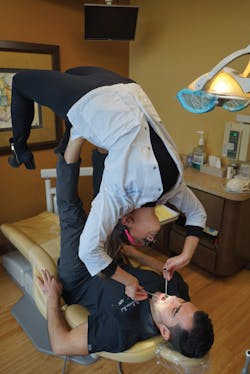Mindset mastery = shifting from disease to ease: Set yourself free
Cristian Pavel, DDS
Danielle Cascioli, DDS
You know that feeling when everything seems perfect, and you feel with 100% conviction that you’re exactly where you need to be? Think about the moment you opened your dental school acceptance letter or when you were handed your diploma on stage.
What if you could train yourself to access this feeling at any given moment? Imagine if you could tap into this feeling when you’re stressed or feeling inadequate. Imagine how much faster and more coherently you’d be able to get out of any bind. Imagine how much more fulfilled your life would be if you didn’t waste a single moment feeling sorry for yourself.
Five years ago, I would have said that this notion might be possible for me only if I were a beach bum or a monk. There’s no way that a responsible person in modern society can “detach” from his or her “reality” without everything crumbling, right?I was wrong, and here’s what I learned
After several years of diving deep into yoga and meditation, I’ve learned some very valuable truths.
• Our circumstances and environment have very little to do with how we think and feel, which is actually based on how we learned to think and feel.
• Failure is far less dangerous than the fear of failing, because the latter is one of the greatest sources of stress and anxiety.
• Stress is our greatest disease.
Here’s the truth—your world is going to crumble, and we’re all destined for death, but this is bleak only if you don’t acknowledge it. The Dalai Lama said it best: “[We] live as if we’re never going to die, and then die having never really lived.”1
If everything we know will inevitably disappear, wouldn’t it make sense to at least enjoy the journey? You get to decide if you enjoy each step, learn from and laugh at each setback, or suffer all the way through with the “I’ll be happy when” mindset. The only way to take control is by paying close attention to how you think.What is meditation?
Many people still believe meditation is the act of stopping your thoughts. This is equally as challenging as stopping your heartbeat because your mind thinks involuntarily, much like your heart beats involuntarily. True meditation is simply the act of observing your thoughts. If you sit quietly in stillness on a daily basis and simply observe, a few magical things will happen:
• You will realize that you are not your thoughts. They merely come through you, and your next thought is just as predictable as this next sentence.
• You will begin to identify your thought patterns, and with time you will become aware of when these patterns might be harming you.
There are endless health benefits to meditating, but I would argue that these are just the side effects. It’s like saying reading is good for you. While a literate person is very likely to be healthier than an illiterate person, the difference in their quality of life is unfathomable.
The same goes for someone who has a strong mindfulness practice versus someone who is “mindfully illiterate” (someone who lives life without ever examining his or her thought patterns). The best way to truly live a full life is by knowing what makes you tick.
After dental school, my greatest focus was on growing and developing my reputation. Anything that threatened it would bring out my worst patterns: fear, blame, and frustration. Whenever a patient was dissatisfied, my greatest fear would surface—the fear of being a terrible dentist. This fear would then drive me to deflect the issue onto the patient, which would cascade into my worst nightmare.In retrospect, it’s easy to see how deflecting responsibility prevented me from gaining what I was ultimately seeking—experience. How could I learn from anything with a default pattern of blame? This paradigm is very insidious and fairly common. The more dentists I coach, the more variations of it I find. I often wonder how different my life would be today had I never recognized and shifted this pattern in myself.
I used to believe that stressed or fearful patients were projecting their stress onto me. This caused me to react to that stress with more stress! If became more acutely aware of the time (even if I wasn’t running late), or I’d find my mind preoccupied with anything but the patient before me. In essence, I became repelled by the patient, which in turn naturally exacerbated the person’s anxiety.
Before I was aware of this pattern, I labeled these people as “problem patients,” and I’d focus on avoiding them as much as possible. Then came a shift fueled by curiosity: “Why am I afraid of these patients? Why are they acting so stressed?”
After recognizing this pattern of avoidance in myself, I made a point to have more in-depth conversations with these patients. I’ve witnessed that curiosity has the potential to not only transform ourselves, but also the people with whom we interact. I attribute some of my best reviews and most loyal patients to this mindful shift in curiosity.
A patient turnaround
My favorite example is of a big, burly custodian, overalls and all, whom I met one day in my chair. Right away I could sense that he did not want to be there. He had his head buried in his phone as if to avoid confrontation, and one leg was hanging off the chair as if he were planning his escape. He answered every question as briefly as possible and rarely looked up at me.
I asked him what his favorite thing in the world was to do, and he unsurprisingly muttered, “I don’t know.” So, I pried until he finally whispered the word “honey” under his breath. My fascination encouraged him to proceed. He told me that the property manager at his work ordered him to destroy a beehive, and upon doing so he tasted the honey and said it was one of the most incredible things he’d ever tasted. This led him to put the hive in a sack, take it home, and devote two weeks to learning how to restore it.
He conceded that on the day he was ready to give up, a miracle happened—a new queen bee had somehow arrived at the hive and started attracting other bees. He had been harvesting honey ever since. As he was telling this story he lit up, his tone became confident, his head lifted, and he even smiled. (He later told me that he never smiled at someone he had just met.) After chatting for 20 minutes, he opened up about all of his dental anxiety and all of the stress it had caused him.
After listening to him, I developed a plan, walked him through it, and he accepted it without question. On his next visit, he even brought me a jar of that honey, and it was indeed the best honey I’d ever tasted.Before I learned how to sit in stillness and examine my thought patterns, I would never have had the capacity for an interaction like that because I was far too focused on my own stress-inducing mindset. We have all developed our own ways of stressing, and our culture is cultivated around this. There are thousands of companies that invest hundreds of billions of dollars in advertisements geared toward making people feel inadequate. Our world is designed around triggering our fight-or-flight survival mechanism.
Fight-or-flight and stress
You may remember this from physiology: our reptilian brains evolved our fight-or-flight response millions of years ago to divert all of our energies away from the growth-focused parts of our bodies (immune, digestive, and cognitive systems) to our survival parts (skeletal muscles and motor cortex). It makes sense that if a predator is looming, we’d want to invest 100% of our energy into dealing with this threat. But does it make sense to activate this reflex constantly? No animal is built to sustain this constant sympathetic stimulation. Having a chronic flood of stress hormones such as adrenaline and cortisol takes an extreme toll on our bodies, leaving our immune, digestive, and repair systems depleted.
This is precisely what has given rise to our current stress epidemic. Despite the myriad research results that warn us of the perils of too much stress, there is still this incessant fear that is seemingly impossible to release. We ask, “If I don’t stress, how will I prosper?”
Here’s the greatest irony of all: our fight-or-flight mechanism diverts energy away from the parts of our brains that are actually useful in getting us through our modern problems and workday. In other words, stress is actually hindering our ability to prosper.
Think of all the times you’ve felt overwhelmed, tight in your muscles, and could not think straight. Imagine instead that you were calm and clear in those moments. Every time you think, “I am not enough until I (open my practice, pay off my debt, grow my practice to $1M, retire, etc.)” you are training your brain to stress more by seeking the things you need in order to feel adequate.
The practice of mindfulness is just that, a practice. Much like dentistry it requires repetition and training. Before I eat my lunch at the office each day, I give myself 10 minutes of stillness. This time allows my internal dialogue to shift from “I need to . . .” to “I get to . . .” This makes each day much more rewarding. By practicing sitting in stillness and observing my steady stream of never-ending thoughts, I get closer to that feeling—that I am exactly where I need to be.Reference
1. Zoe B. 10 inspiring quotes from the Dalai Lama. Mind Body Green website. https://www.mindbodygreen.com/0-6159/10-Inspiring-Quotes-From-the-Dalai-Lama.html.
CRISTIAN PAVEL, DDS, and DANIELLE CASCIOLI, DDS, are the founders of Revive the Dream–Vitality Retreats for Dentists and the HiiVibe Dental Tribe, a private mobile app environment for health-driven dentists on the hiitide.com health platform. Dr. Pavel graduated from the University of Illinois at College of Dentistry in 2014, and Dr. Cascioli from the University of Toronto Faculty of Dentistry in 2016. They enjoy working together on smile transformations and practicing acro-yoga. They recently launched the HiiVibe Dental Tribe. For more information visit dentalyogis.com or follow their journey on Instagram @thedentalyogis.





